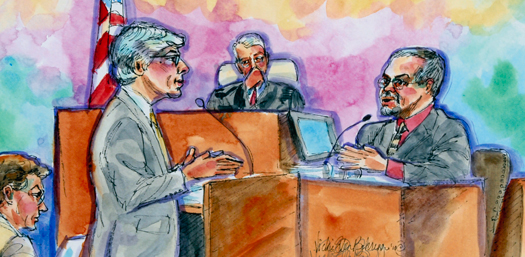Marriage News Blog

One the seventh day of trial, Stanford political science professor Gary Segura testified about the political powerlessness of gays and lesbian people in the United States.┬Ā Professor Segura explained that gay and lesbian Americans lack a meaningful degree of political power, and possess less political power than other minority groups that have been granted judicial protection.
Professor Segura is the Chair of Chicano/a Studies in the Center for Comparative Studies of Race and Ethnicity at Stanford.┬Ā He is also co-director of the Stanford Center for American Democracy, where he is one of three Principle Investigators of the American National Elections Studies, which provides political scientist with data about the American electorateŌĆÖs view on politics.
Watch James Pickens, Jr. reenact Professor SeguraŌĆÖs testimony during the Los Angeles premiere of ŌĆ£8ŌĆØ the play.
Testimony Highlights
ŌĆ£I want to offer three, which I think speak to the questions that I was asked to consider.ŌĆ£The first is that, in my view, when we consider the U.S. political system, gays and lesbians do not possess a meaningful degree of political power. They are not able to protect their basic interests and effectuate their interests into law and to secure those.
ŌĆ£The second is that, relative to some other groups that currently enjoy judicial protection, gays and lesbians are actually, in the statutory and constitutional sense, worse off than some of those groups were when they were granted judicial protection.
ŌĆ£And, finally, I’m deeply troubled by some of the comments or some of the conclusions that Professor Miller drew in his rebuttal, and I find them unpersuasive.ŌĆØ
ŌĆ£[T]he role of prejudice is profound. ┬ĀŌĆ” [I]f the group is envisioned as being somehow or another morally inferior, a threat to children, a threat to freedom, if there’s these deeply-seated beliefs, then the range of compromise is dramatically limited.┬Ā It’s very difficult to engage in the give-and-take of the legislative process when I think you are an inherently bad person. That’s just not the basis for compromise and negotiation in the political process.ŌĆØ
ŌĆ£[T]he American public is not very fond of gays and lesbians.ŌĆØ
ŌĆ£[R]eligion is the chief obstacle for gay and lesbian political progress, and it’s the chief obstacle for a couple of reasons.ŌĆ£The first is that after government, it’s difficult to think of a more powerful social entity in American society than the church. Religion is something that deeply connects to people’s lives. Indeed, America is a very church-going nation compared with other western democracies. It provides the opportunity for people to meet together on a weekly basis.
ŌĆ£So it’s a very powerful organization, and in large measure they are arrayed against the interests of gays and lesbians. There are exceptions, but in large measure they are arrayed against gays and lesbians.
ŌĆ£[B]iblical condemnation of homosexuality and the teaching that gays are morally inferior on a regular basis to a huge percentage of the public makes the political ground, the political opportunity structure very hostile to gay interests. ┬ĀIt’s very difficult to overcome that.ŌĆØ
ŌĆ£[ProponentsŌĆÖ expert] Dr. Young freely admits that religious hostility to homosexuals is an important role in creating a social climate that’s conducive to hateful acts, to opposition to their interest in the public sphere, and to prejudice and discrimination.ŌĆØ
ŌĆ£[O]ver the last five years, there has actually been an increase in violence directed towards gay men and lesbians. ŌĆ”
ŌĆ£[G]ays and lesbians are representing a larger and larger portion of the number of acts of bias motivated violence. ŌĆ”
ŌĆ£73 percent of all the hate crimes committed against gays and lesbians also include an act of violence ŌĆ” we are talking about the most extreme forms of hate based violence, so rape and murder. 71 percent of all hate-motivated murders in the United States were of gay men and lesbians in 2008.
ŌĆ£Fifty-five percent of all hate-motivated rapes were against gays and lesbians in 2008.┬Ā ŌĆ”
ŌĆ£There is simply no other person in society who endures the likelihood of being harmed as a consequence of their identity than a gay man or lesbian.ŌĆØ
ŌĆ£[O]ne of the enduring ŌĆ” tropes of anti-gay argumentation has been that gays are a threat to children. ŌĆ” [I]n the Prop 8 campaign [there] was a campaign advertisement saying, ŌĆśAt school today, I was told that I could marry a princess too.ŌĆÖ And the underlying message of that is that ŌĆ” if Prop 8 failed, the public schools are going to turn my daughter into a lesbian.ŌĆØ
